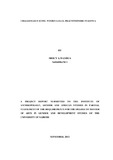| dc.description.abstract | Gender inequality in the legal profession has continued to undermine the delivery of
justice. The aim of this study was to investigate the gender related challenges facing
women legal practitioners with specific emphasis on the social and cultural
challenges as well as economic and professional challenges. The study intended to
provide a platform to relevant stakeholders in the legal profession for addressing
gender inequalities within the private legal practice. The study adopted Feminist
Legal theoretical framework by Margaret Thornton, A conceptual framework was
logically designed to describe the model of the problem, causes, strategies and results
of women legal practitioners. The study was based on the assumption that women
legal practitioners in Kenya face social and cultural challenges as well as economic
and professional challenges which are gender related and common and can be
overcome. The study employed a cross sectional descriptive survey focusing on
women legal practitioners within three categories; partners, sole proprietors and
associates. The target population comprised of women legal practitioners within the
three categories practicing within Nairobi County .The Researcher stratified data from
the register of advocates with the Law Society of Kenya, in regard to the number of
women and men legal practitioners in the three categories of private practice in
Kenya, simple random sampling was used to select the sample size for the study. A
semi-structured questionnaire was used to collect data from the respondents followed
by interviews. Data was analyzed quantitatively and qualitatively by descriptive
statistics and was presented in form of tables, charts, graphs and narratives. The study
established that women in the legal profession still remain underrepresented in
position of greatest status, influence and economic reward in law firms. Women face
gender related challenges; social and cultural challenges which include lack of proper
accommodation of familial roles, sexual harassment, limited career advancement,
stereotypes and gender discrimination including sexist behavior, harassment,
demeaning comments. Women legal practitioners are faced by economic and
professional challenges, with fewer women reaching the level of partnerships, unequal
pay, lack of mentors, lack of policy to address sexual harassment and promotions in
the law firms. The findings also indicated that employer’s offers women legal
practitioners work assignment and career opportunities that are generally less
challenging or of lower profile than those of men. It was concluded that women legal
practitioners are faced by both social and cultural challenges as well as economic and
professional challenges. The study recommends for the Law Society of Kenya to
develop gender model policies necessary to enhance women welfare in the legal
practice and provide equal opportunities for the advancement of women in the legal
field. Law firm needs to put in place strategies to increase gender equality and
implement concrete steps to assist their women lawyers in advancing their career.
Law firms need to develop and implement reduced hour policies, written full time flex
policies and provide backup child care facilities. | en |

